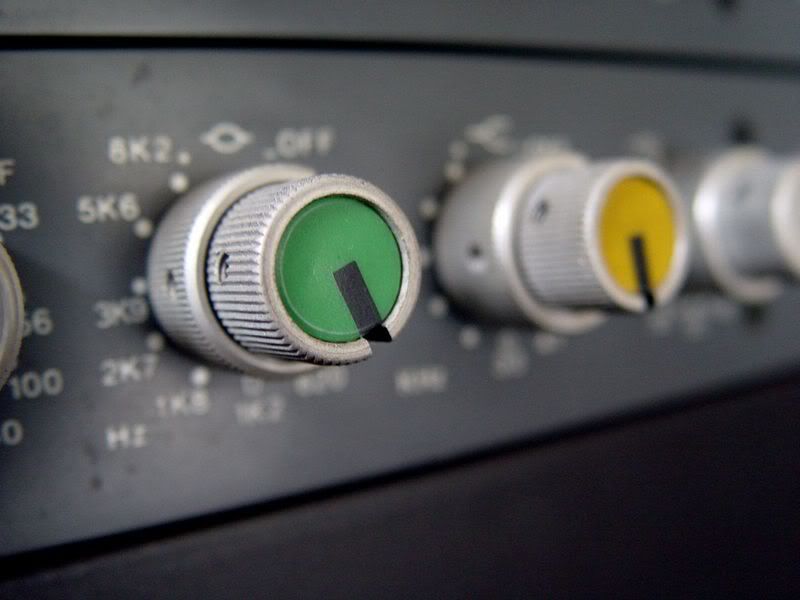Resistors?
- Dr.Chewbacca
- audio school graduate
- Posts: 14
- Joined: Thu Dec 08, 2005 11:50 am
- Location: Wisconsin
Resistors?
I am going to rebuild one of my old TAPCO mixers, what brand of resistor sounds the best in this application?
Polka sooths even the most savage beast.
- oldguitars
- steve albini likes it
- Posts: 356
- Joined: Wed Aug 08, 2007 10:17 am
- Location: Washington DC
- Contact:
+1 to the above.
I've seen a lot of goofball people debating the difference in sound between wooden and plastic knobs on stereos. People debate brands and types of capacitors (to which there may be some merit, in my experience), different brands of this and that, and in some cases there is validity to it and in some cases it's just nutty.
But I've NEVER seen a serious debate on BRANDS of resistors. Maybe it's because they're anonymous looking and they all sorta look alike and the brand isn't written on them. There's a lot of psychology there.
I HAVE seen debates about the appropriateness of carbon comp, carbon film, and metal film resistors, etc. And in SOME rare applications and circumstances this debate is worth having. But rarely at the voltages and operating temps seen in solid-state gear (those are the two factors that cause carbon comp resistors to act sorta unique sometimes).
In this case, as others have said, pretty much anything will do. I'd probably use metal film in this application for most durability, precision and lowest noise.
I've seen a lot of goofball people debating the difference in sound between wooden and plastic knobs on stereos. People debate brands and types of capacitors (to which there may be some merit, in my experience), different brands of this and that, and in some cases there is validity to it and in some cases it's just nutty.
But I've NEVER seen a serious debate on BRANDS of resistors. Maybe it's because they're anonymous looking and they all sorta look alike and the brand isn't written on them. There's a lot of psychology there.
I HAVE seen debates about the appropriateness of carbon comp, carbon film, and metal film resistors, etc. And in SOME rare applications and circumstances this debate is worth having. But rarely at the voltages and operating temps seen in solid-state gear (those are the two factors that cause carbon comp resistors to act sorta unique sometimes).
In this case, as others have said, pretty much anything will do. I'd probably use metal film in this application for most durability, precision and lowest noise.
- inverseroom
- on a wing and a prayer
- Posts: 5031
- Joined: Wed May 07, 2003 8:37 am
- Location: Ithaca, NY
- Contact:
Are you sure you need to replace them though? Unless they're old carbon comps, it's highly unlikely there's anything wrong with them. The caps you will definitely want to replace.
I have only encountered bad resistors once--in my Wurlitzer 206. I'm sure amp techs deal with them all the time, though.
I have only encountered bad resistors once--in my Wurlitzer 206. I'm sure amp techs deal with them all the time, though.
"Bad" resistors (as in completely FUBAR'ed) - not very common unless something else fails first and takes other parts out.
However, I've dealt with resistors of drifting value in a lot of old stuff, like my Hammond M-3.
If you're going to be in there anyway and feel comfortable with desoldering a lot of components, I say go for it.
However, I've dealt with resistors of drifting value in a lot of old stuff, like my Hammond M-3.
If you're going to be in there anyway and feel comfortable with desoldering a lot of components, I say go for it.
- Scodiddly
- genitals didn't survive the freeze
- Posts: 3976
- Joined: Wed Dec 10, 2003 6:38 am
- Location: Mundelein, IL, USA
- Contact:
Whatever the basic metal film ones Mouser carries... the ones that are 1/4 watt and go for a few cents each, with a huge price break at 200.
I've seen resistors drift a fair bit in older tube gear, especially the cheap carbon resistors like you'd find in Silvertone amps. The nice thing is that they always drift high in value, so you can do some basic ohmmeter testing without having to remove the resistors from the circuit (being in the circuit might make a resistor read lower than it really is, but can never make it read higher).
I've seen resistors drift a fair bit in older tube gear, especially the cheap carbon resistors like you'd find in Silvertone amps. The nice thing is that they always drift high in value, so you can do some basic ohmmeter testing without having to remove the resistors from the circuit (being in the circuit might make a resistor read lower than it really is, but can never make it read higher).
- inverseroom
- on a wing and a prayer
- Posts: 5031
- Joined: Wed May 07, 2003 8:37 am
- Location: Ithaca, NY
- Contact:
The other side of that argument is, why are you restoring the thing in the first place? Do you like the way it sounds? If so, why would you change every single component in it?nate wrote: If you're going to be in there anyway and feel comfortable with desoldering a lot of components, I say go for it.
Especially in older gear, drifted components, 'aged-in' components, etc all contribute to the sound.
Additionally, while I can't explain it scientifically, things seem to sound better when their components have 'aged together' somehow. I don't know why but every time I build an amp, it sounds lackluster for about the first 60 to 100 hours and then everything seems to gel. Even through old speakers, etc. so it's not the speaker aging. I do know capacitors 'break in' so that might have something to do with it. This phenomenon might also explain why real vintage amps always seem to sound cooler than 'clones,' even clones made with the highest quality of components, and even clones made with scavenged old parts (like I like to do). But I'm going WAY off topic here...
- Dr.Chewbacca
- audio school graduate
- Posts: 14
- Joined: Thu Dec 08, 2005 11:50 am
- Location: Wisconsin
I asked myslef this question as well, part of the reason I am completly restoring the mixer is for practice, I am going through an electronics program and this was the easiest board I had to work on. There are not alot of parts! I took some readings and did some mixes before I started??????? wrote:The other side of that argument is, why are you restoring the thing in the first place? Do you like the way it sounds? If so, why would you change every single component in it?nate wrote: If you're going to be in there anyway and feel comfortable with desoldering a lot of components, I say go for it.
Especially in older gear, drifted components, 'aged-in' components, etc all contribute to the sound.
Additionally, while I can't explain it scientifically, things seem to sound better when their components have 'aged together' somehow. I don't know why but every time I build an amp, it sounds lackluster for about the first 60 to 100 hours and then everything seems to gel. Even through old speakers, etc. so it's not the speaker aging. I do know capacitors 'break in' so that might have something to do with it. This phenomenon might also explain why real vintage amps always seem to sound cooler than 'clones,' even clones made with the highest quality of components, and even clones made with scavenged old parts (like I like to do). But I'm going WAY off topic here...
ripping the board apart and thought I would compare them when I was finished. It's pretty much education and experimentation at this point. However I do agree that it's the drifting values of the parts that make old vintage stuff sound the way they do.
Thanks for your input everybody.
Polka sooths even the most savage beast.
-
Jim Williams
- tinnitus
- Posts: 1135
- Joined: Sat Jun 03, 2006 8:19 am
- Location: beautiful Carlsbad, CA
- Contact:
Resistors can make a significant improvement on sonics if the rest of the circuit is up to snuff. If you are already using top notch opamps (not the 4558 stuff these were made with) resistors can add that extra bit of detail. Since all audio runs through them they do affect the sound. Once you have replaced or removed the coupling caps, bypassed those with quality film caps or servos or direct couple with precision opamps, the resistors are next.
I like the Dale RN series for low cost metal films. Next up the food chain is Caddocks. Further on up the road is the Vishay bulk foils, the best resistors hands down but you will pay dearly for them. Using silver based solder also helps.
Try it and report your findings...
I like the Dale RN series for low cost metal films. Next up the food chain is Caddocks. Further on up the road is the Vishay bulk foils, the best resistors hands down but you will pay dearly for them. Using silver based solder also helps.
Try it and report your findings...
Jim Williams
Audio Upgrades
Audio Upgrades
-
Knights Who Say Neve
- buyin' a studio
- Posts: 985
- Joined: Sun Feb 15, 2004 6:27 pm
- Location: The Mome Raths Outgrabe
??????? wrote:It may be psychology. It takes time to adjust to a new amp.nate wrote: I don't know why but every time I build an amp, it sounds lackluster for about the first 60 to 100 hours and then everything seems to gel. Even through old speakers, etc. so it's not the speaker aging.
"What you're saying is, unlike all the other writers, if it was really new, you'd know it was new when you heard it, and you'd love it. <b>That's a hell of an assumption</b>". -B. Marsalis
Who is online
Users browsing this forum: No registered users and 73 guests



